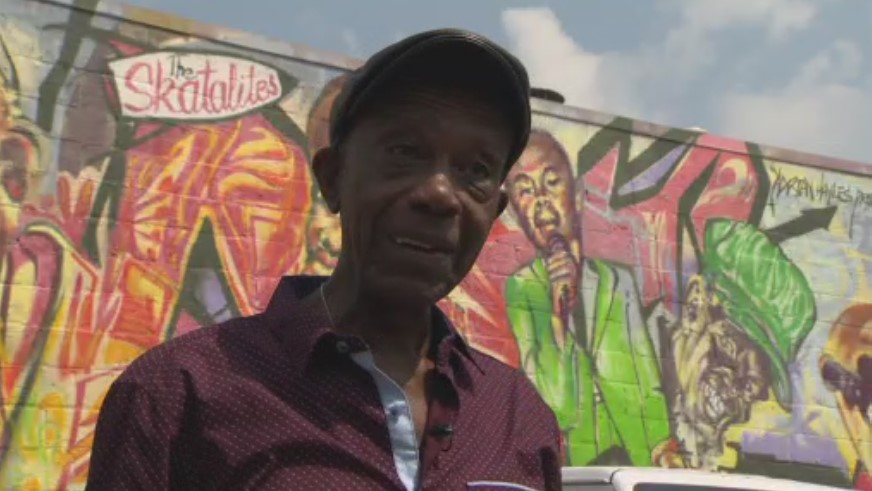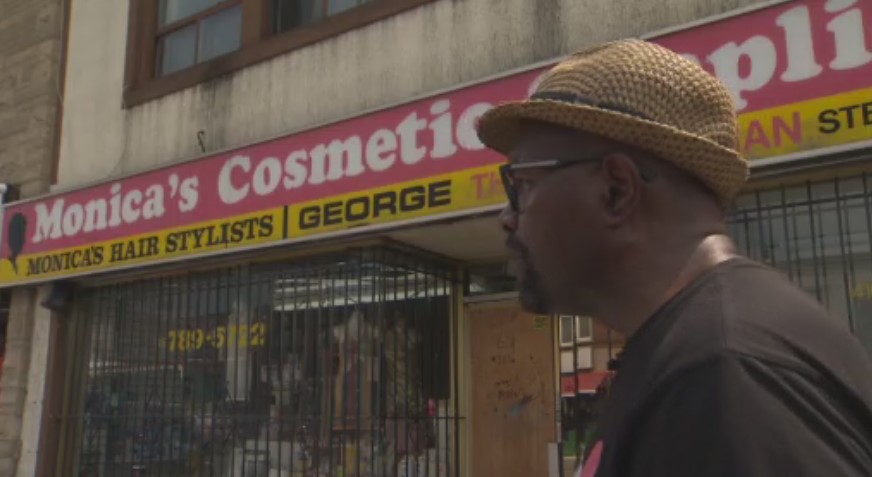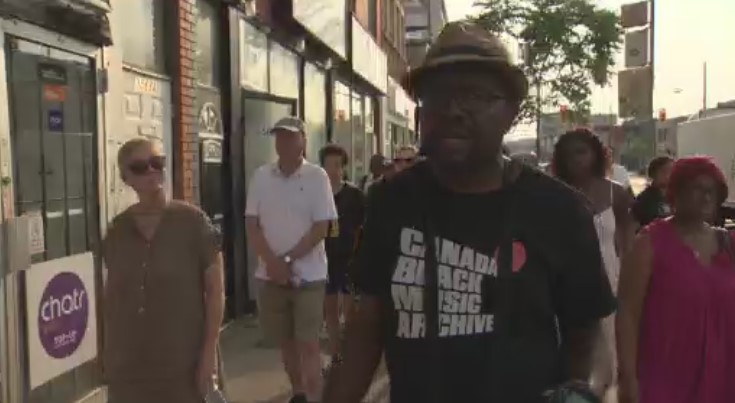Lately, Phil Vassell has been spending his days giving music history walking tours of Toronto’s Little Jamaica.

Global News joined the executive director of the Canadian Black Music Archives for an exclusive walking tour down Eglinton West one hot afternoon, in the heart of the ethnic enclave.
“First stop on this tour is Wisdom’s Barbershop,” Vassell said, gesturing to the sign above the barbershop, which he says the late Jimmy Wisdom owned and ran in the community for over 41 years.
“He was a member of a (singing) duo called Bob and Wisdom,” Vassell said. “He migrated from Montego Bay to this part of town…. Singing became a side hustle, if you will, and in the basement of his store was a rehearsal space.”
In the ’60s, ’70s and ’80s, coinciding with a wave of pioneering Jamaicans migrating to Canada, Vassell said it wasn’t uncommon to see some of the biggest names in reggae music, like Jackie Mittoo, Leroy Sibbles and even Bob Marley, meandering through Little Jamaica, rehearsing and recording in the basements of stores.
“There’s a lot of oral history here, not enough written history,” Vassell said. “We would like to research and document and preserve this so that generations of the future can have something to look forward to.”

Get breaking National news
Preservation, Vassell says, is key. He notes that years of LRT construction, gentrification and neglect have nearly wiped this community off the map.
It’s been a tough thing to witness for Jay Douglas, who witnessed and benefited from Little Jamaica in its glory days. In the ’60s, Douglas fronted The Cougars, a popular group in the Caribbean nightclub scene in Toronto and Montreal that played a mix of everything from ska and reggae to blues and funk.
The three-time Juno Award nominee’s contributions are forever memorialized by his likeness on a giant mural that covers Reggae Lane in Toronto’s Little Jamaica.
“Growing up in this neighbourhood, this is where all the action happened,” Douglas told Global News, his words illustrated by the colourful mural behind him. “This is where we shopped, this is where we hung out and rehearsed.
“We need to teach the children, the grandchildren, we need to teach them and share the culture with them so that they can carry it.”
Fergus Hambleton, singer-songwriter of Juno Award-winning Canadian reggae ensemble The Sattalites, also traces the origins of the band, which started as a music school, to Little Jamaica.
“About mid-’70s, I started to come up to this area,” Hambleton said, standing in front of another longtime community staple, Spence’s Bakery.
“Jo Jo (Bennett) and I started a little music school, just up the street here,” Hambleton gestures to a building with a sign that now reads ‘Carib Jewellery.’
“And the students would come and play their songs. So this whole area was fantastic for just being a musical spot.”
Back on the interactive tour, Vassell took Global News to one of Little Jamaica’s oldest and most influential establishments located in the heart of the neighbourhood.
“Monica’s was one of the first Black-owned and operated businesses in this area,” Vassell said, pointing at the iconic red, white and yellow sign that adorns a storefront, reading ‘Monica’s Cosmetic Supplies Ltd.’
“They started in the late ’60s, according to Monica’s son,” Vassell said. “They had a basement studio and that basement studio cut the first rap record ever to be recorded in Canada …. called Ladies Delight that was done by a gentleman by the name of Mr. Q.”
For those who joined the public tour at 5 p.m. that same evening, one sentiment kept coming up: a newfound appreciation of Little Jamaica’s rich history.








Comments
Want to discuss? Please read our Commenting Policy first.